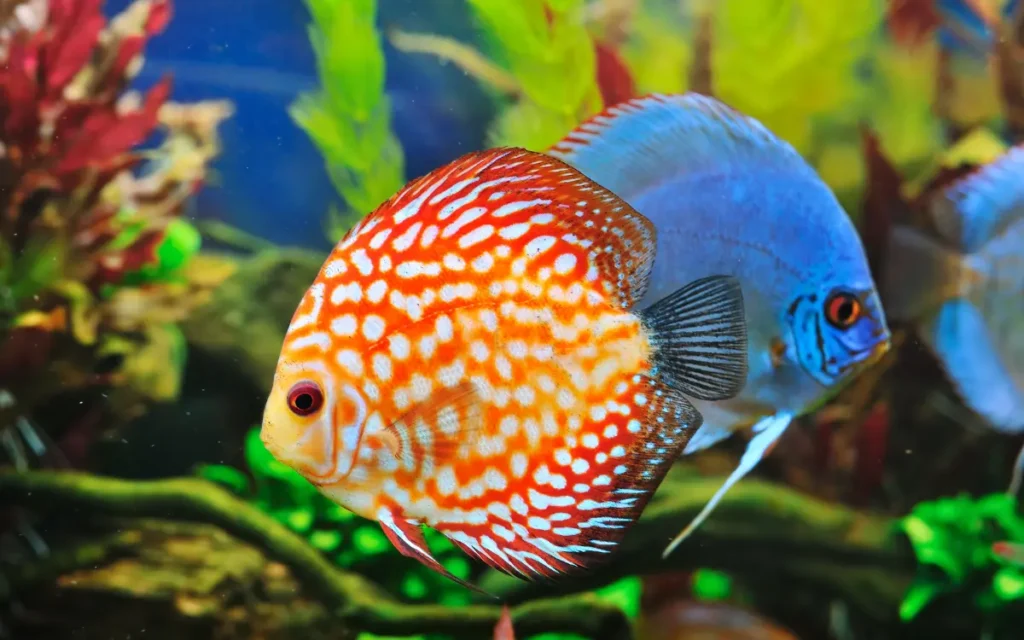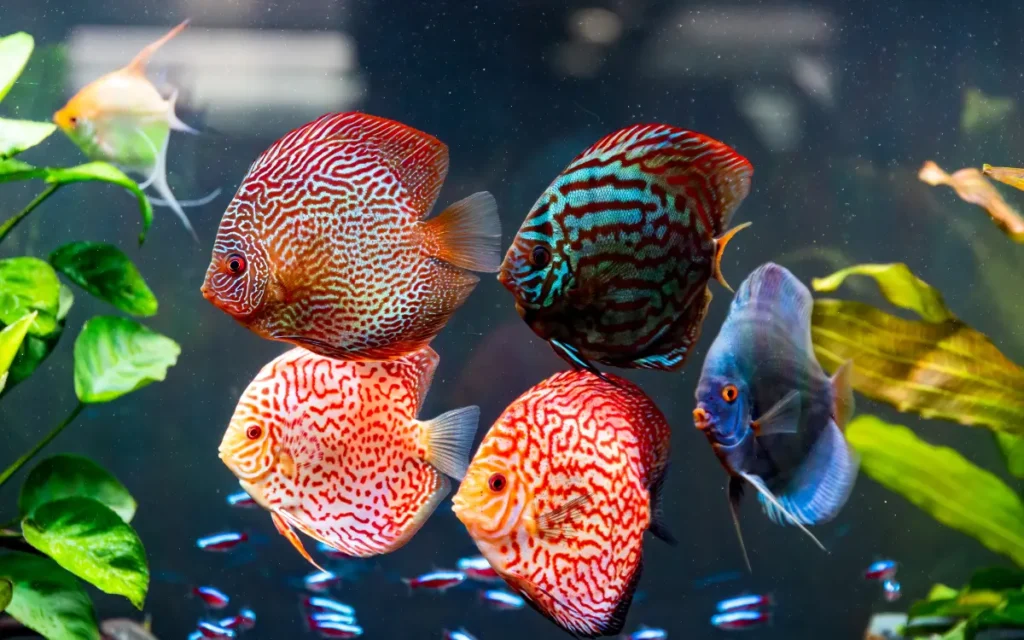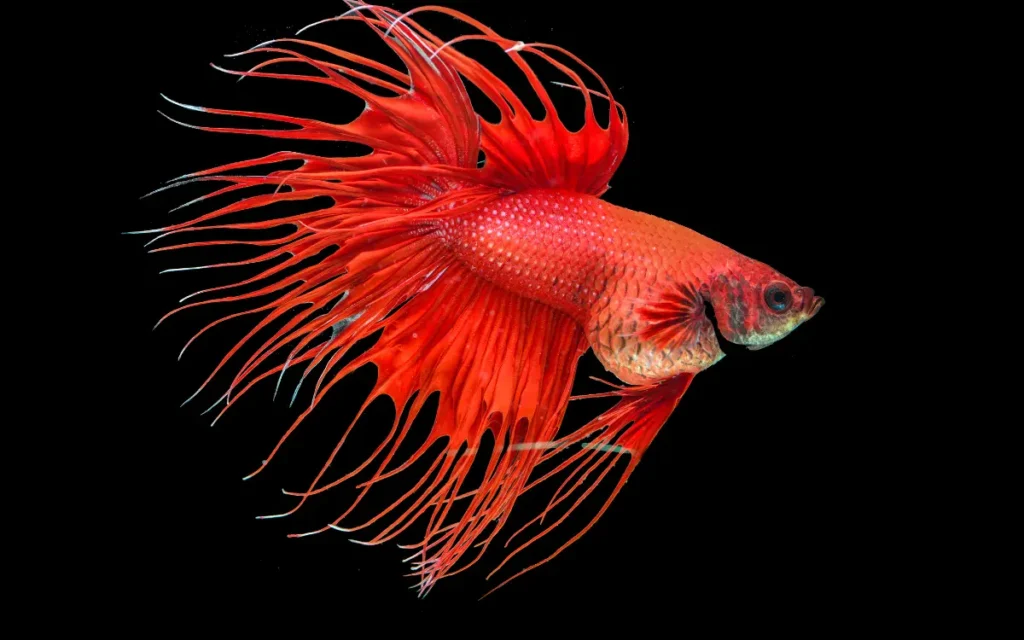Discus fish are colorful, round-shaped freshwater fish from South America. Known for their peaceful nature and graceful movement, they are popular in planted aquariums. Discus thrive in warm, clean water and prefer living in groups. With proper care, they can grow up to 8 inches and live for 10 to 15 years, making them a favorite for aquarists who want a stunning centerpiece fish.
Discus Fish Care and Tank Setup

Discus fish need a clean, stable environment to stay healthy and show their best colors. A 50-gallon tank or larger is ideal for a small group, as they are social fish that feel safer in numbers. The water should be warm, between 82 and 86°F, and slightly acidic with a pH of 6.0 to 7.0. Soft water suits them best, as it matches their natural Amazon habitat.
A gentle filter is important because Discus dislike strong currents. Make sure the tank has good biological filtration to handle waste and keep the water clear. Use fine sand or smooth gravel as substrate, and decorate the tank with driftwood, rocks, and hardy plants like Amazon Sword, Anubias, and Java Fern. These features provide hiding places and help reduce stress.
Lighting should be moderate. Too much brightness can make Discus nervous, but floating plants or adjustable lights can help create a softer look. To keep the water quality high, change about 25 to 30 percent of the water each week. Clean the substrate and remove leftover food during maintenance.
Feeding Discus Fish

Discus fish need a varied diet to stay healthy and show off their bright colors. They enjoy high-quality flake or pellet foods made for Discus, along with frozen or live foods like bloodworms, brine shrimp, and beef heart. A mix of these foods helps provide the protein and nutrients they need.
Adults should be fed two to three times a day, while young Discus need smaller meals more often, around three to five times daily. It’s best to feed only what they can eat within a few minutes. This keeps the water cleaner and prevents waste from building up. After feeding, remove any leftover food so it doesn’t harm water quality.
Adding occasional vitamin or mineral supplements can boost their immune system and support vibrant color. A steady feeding routine helps reduce stress and keeps Discus happy and active.
Breeding Discus Fish
Breeding Discus can be rewarding, but it takes care and the right setup. Start with a healthy pair that is at least 12 months old. Some aquarists choose pairs naturally from a group, while others buy already bonded pairs.
A separate breeding tank works best. A 20-gallon tank with soft, warm water between 82 and 86°F and a pH of 6.0 to 6.5 helps create the right conditions. A bare bottom tank is easier to clean, and adding a flat rock or breeding cone gives the pair a place to lay eggs. A sponge filter is ideal because it keeps the water clean without creating strong currents.
Once ready, the female will lay eggs on the chosen surface, and the male will fertilize them. The parents take care of the eggs, fanning them and keeping them clean. The eggs usually hatch within two to three days. The fry feed on the parents’ skin mucus at first, then move on to baby brine shrimp as they grow.
Good water quality is key. Clean the tank often and keep an eye on the health of both parents and fry to ensure a successful spawn.
Best Tank Mates for Discus Fish
Discus fish are peaceful and do best with other gentle species that can live in warm, soft water. Small schooling fish like Cardinal Tetras and Rummy Nose Tetras are excellent choices. Their calm nature and similar water needs make them ideal companions.
Corydoras catfish work well too. They stay at the bottom of the tank and help keep it clean without bothering the Discus. Bristlenose Plecos are another good option because they control algae and are small enough not to compete for space.
Ram Cichlids, Glowlight Tetras, Harlequin Rasboras, and Hatchetfish also make suitable tank mates. These fish add life and color to the aquarium while staying peaceful around the Discus.
Always choose tank mates that won’t nip at fins or cause stress. Keeping the water warm and clean helps all the fish thrive together.
FAQs
Why are Discus fish so expensive?
Discus fish are costly because they need careful breeding, special water conditions, and lots of care to raise healthy, colorful fish.
Can I keep just one Discus fish?
Discus are social and do better in groups of at least five or six. A single Discus may feel stressed and act shy.
How long do Discus fish live?
With good care, Discus fish can live for 10 to 15 years in a home aquarium.
Do Discus fish lay eggs?
Yes, Discus fish lay eggs on flat surfaces like rocks or breeding cones. Both parents care for the eggs and fry.
What temperature do Discus fish need?
Discus fish thrive in warm water between 82 and 86°F.
Can Discus fish live with tetras?
Yes, peaceful tetras like Cardinal or Rummy Nose Tetras are good tank mates for Discus.

 **2. Platy** Platies are hardy and easygoing. They enjoy swimming in groups and come in a variety of bright colors. Great for peaceful community tanks. ➡️ [Platy Fish Guide →](#) **3. Zebra Danio** Known for their energy and toughness, zebra danios are perfect for cycling new tanks. They tolerate a wide range of conditions and like to dart around in groups. ➡️ [Zebra Danio Guide →](#) **4. Corydoras Catfish** Peaceful bottom-dwellers that help keep your tank clean. Keep them in groups of 3 or more and give them soft substrate. ➡️ [Cory Catfish Care →](#) **5. Molly** Adaptable to various water conditions (even brackish), mollies are lively and great for community aquariums. ➡️ [Molly Fish Care Guide →](#) **6. Swordtail** Easy to care for and great in peaceful groups. Males have a signature sword-like tail and love swimming space. ➡️ [Swordtail Fish Guide →](#) **7. Betta Fish** Low-maintenance and visually stunning. Best kept alone or with very peaceful tank mates like snails or Corydoras. ➡️ [Full Betta Fish Care Guide →](#) **8. Neon Tetra** Small and peaceful, neon tetras love to school and light up a planted tank. Keep them in groups of 6 or more. ➡️ [Neon Tetra Care Guide →](https://oceanbitez.com/neon-tetras/) **9. Harlequin Rasbora** A calm and schooling species that fits right into community setups. Easy to feed and care for. ➡️ [Harlequin Rasbora Guide →](#) **10. Dwarf Gourami** A gentle and colorful addition to a beginner’s tank. Likes planted environments and peaceful neighbors. ➡️ [Dwarf Gourami Guide →](#) **11. White Cloud Mountain Minnow** Can live in cooler temperatures and is perfect for unheated tanks. Small, peaceful, and easy to care for. ➡️ [White Cloud Minnow Guide →](#) **12. Cherry Barb** Peaceful and social, cherry barbs do well in planted tanks and enjoy being in small groups. ➡️ [Cherry Barb Care →](#) --- ### Sample Beginner Tank Combos **Combo 1: 10–15 Gallon Easy Starter** * 4–6 Guppies * 3 Corydoras Catfish * 1 Nerite Snail **Combo 2: 20 Gallon Planted Community** * 6 Harlequin Rasboras * 6 Neon Tetras * 1 Dwarf Gourami * 3 Otocinclus (optional if algae control is needed) --- ### Beginner Tips for a Successful Aquarium * Cycle your tank before adding fish (ammonia → nitrite → nitrate) * Start with hardy species before delicate ones * Feed small amounts once or twice daily * Do weekly partial water changes (20–30%) * Don’t mix aggressive or fin-nipping species * Use a heater for tropical fish (75–80°F) --- ### Final Thoughts These beginner fish are ideal for getting started in the hobby without frustration. They're low-maintenance, compatible, and fun to watch. Once you’re comfortable, you can explore more advanced species and community combinations. ➡️ Check out our full guide to [Freshwater Aquarium Fish →](https://oceanbitez.com/freshwater-fish/)](https://oceanbitez.com/wp-content/uploads/2024/06/Best-Freshwater-Fish-for-Your-Aquarium-1024x640.webp)
